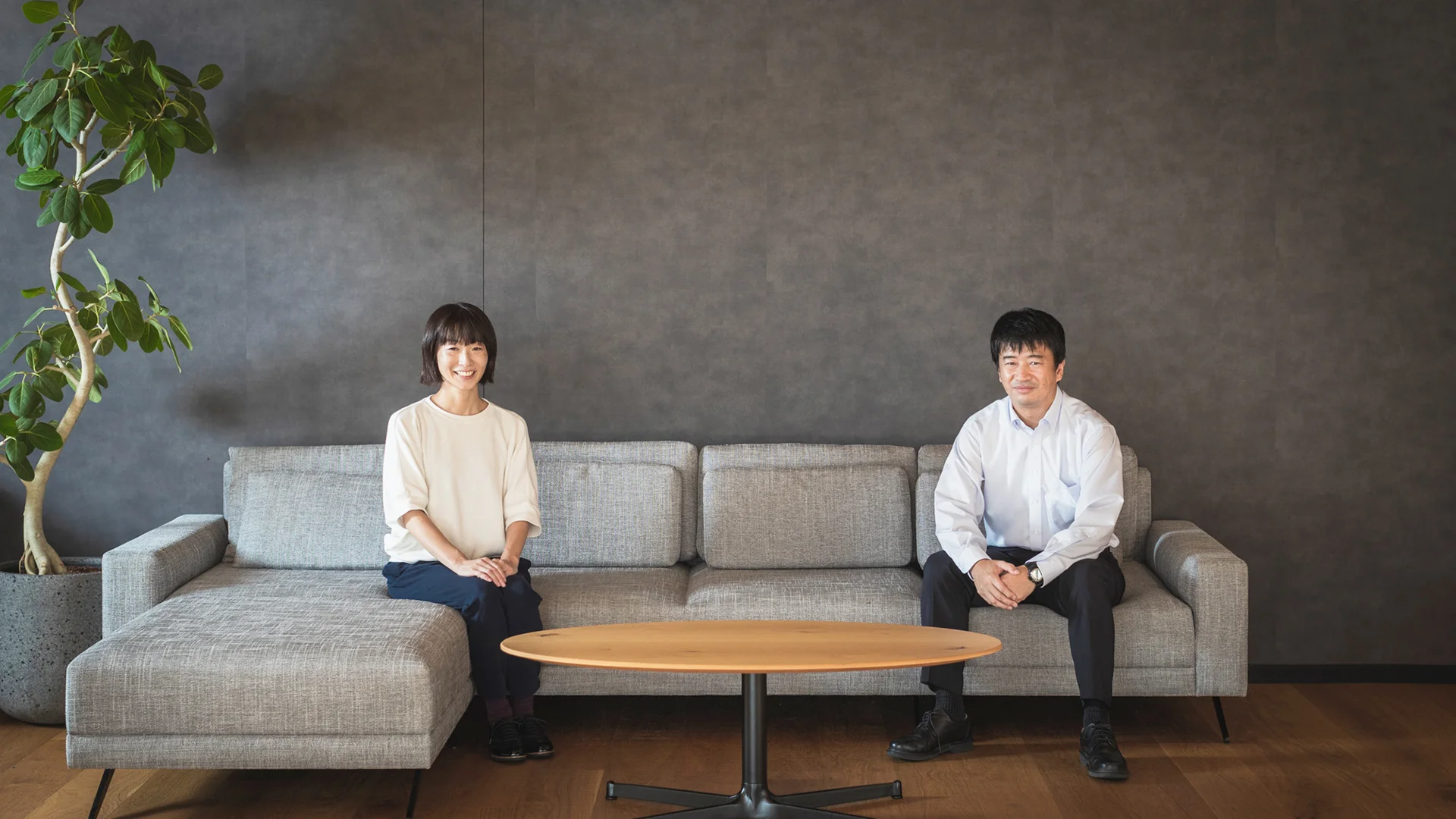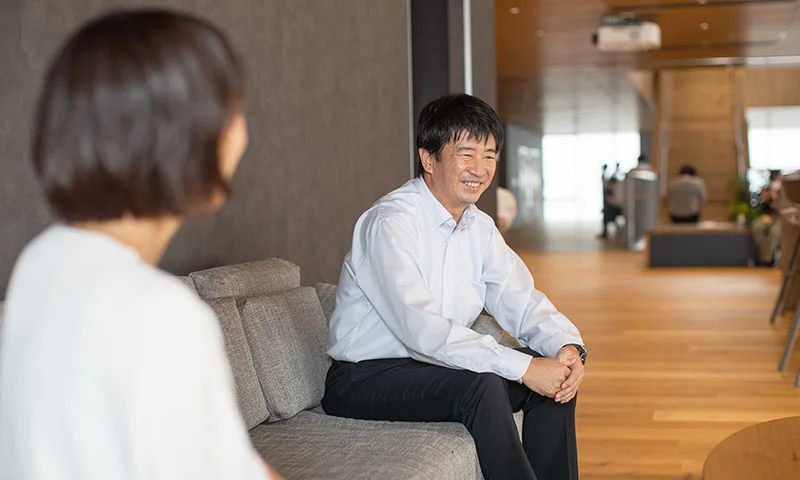Did you find this article helpful for what you want to achieve, learn, or to expand your possibilities? Share your feelings with our editorial team.


Feb 8, 2023
CAREER & LIFESupport from coworkers after returning from maternity and child-rearing leave: speaking one’s mind openly is the key to a better workplace
The importance of speaking one’s mind honestly, and listening to others when they do the same
To enable employees to continue their career while raising a family, company support systems are important, as well the understanding and encouragement of co-workers. According to Motomi Ishikawa of DENSO Corporation’s Sensing Systems & Semiconductor R&D Div., her workplace provided a high level of support when she took maternity and child-rearing leave. Let’s explore the workplace benefits offered by DENSO through a conversation between Ishikawa and her manager, Masahiro Honda.
Contents of this article
Ishikawa’s career before maternity leave: an engineer who never makes compromises

Motomi Ishikawa joined DENSO in April 2007. She was assigned to the Sensing Systems & Semiconductor R&D Div. and worked there until 2016, developing material technologies for next-generation products. She then requested a transfer to the Division’s Research Sect. as she wanted to challenge herself with future-oriented research and development work.
After two years of researching cutting-edge materials that could improve the performance of optical products for automated driving, she returned to her current division in 2019. Since then she has been involved in developing materials for power cards, which switch power on and off at high speed, for eco-friendly electric vehicles and hybrid vehicles.
Ishikawa: “By improving heat dissipation for power-card materials, we hope to reduce costs and improve product performance. DENSO and I have been trying to develop materials with better heat dissipation for many years now, and I am determined to bring them out to the world.”
Ishikawa’s mission to develop the materials started in 2012.
Ishikawa: “When I first got involved in developing heat-dissipating materials for power cards, my goal was to improve the material characteristics beyond industry standards. However, I lacked knowledge and experience in the field, so my task didn’t go too well.
Therefore, I asked to be dispatched to a material manufacturer for half a year, where I received a thorough grounding in materials and processes. In regard to theoretical design, I sought out joint research work with a university and collaboration with SOKEN, Inc., a DENSO Group company.”
By working with manufacturers and a university, Ishikawa was able to achieve material characteristics that surpassed the target specifications and set some of the highest industry standards. Moreover, she applied for an impressive 20 new patents. The basic technologies she created through joint research with the university are still being developed by younger members at DENSO today. However, despite Ishikawa’s ambitious nature, which has brought her so many successes, the technologies she developed never made it into any commercial products.
When Ishikawa returned to work at the Packaging R & D Dept., her manager Masahiro Honda recommended her to a leader for the project to develop heat dissipation materials for power cards. Aside from her ability, Honda had another reason for recommending her.
Honda: “Motomi Ishikawa never compromises on anything and is eager to learn. In short, she can readily become a specialist in any field. However, no matter where she was assigned within the company, she tended to do everything on her own, without relying on others. She would put her current task first and become totally absorbed in it, without really considering teamwork. That’s what she was like before her reassignment.
When she returned to my department, we talked with each other many times to reconcile our values, and I felt that it will help her move forward in her career to be a project leader.”
After being assigned as project leader, Ishikawa changed completely.
Honda: “Once she was assigned to a big project, she began to focus hard on finding ways to cooperate with her team members. She always took actions on her own initiative in her work assigned to her so far, and now she does the same in her team management.
She really cared a lot about everyone on her team, and began to ask me for advice more often, saying “I am going to change it like this”, and I encouraged her to do what she wanted to do, saying “OK, let’s do it”. I watched as Motomi change how she managed her team and approached her work, and became a more dependable worker as a result.”
Ishikawa put a lot of thought into ways of more efficiently running her team, and began to stand out as an effective leader.
Support from Ishikawa’s manager and other DENSO associates when she was apprehensive about taking leave

Amid her dedicated project efforts together with the team, Ishikawa reached a turning point in her life in January 2021.
Ishikawa: “During the New Year holiday, I found out that I was pregnant. From a young age, I had spent most of my time cooped up in the lab, and I was often the last one on my floor to leave work at the end of the day. I had been so focused on my own ambitions that I barely considered having children, so raising my own child while continuing a career seemed unimaginable [laughs].
At the time, I was about to be promoted to manager following the New Year holiday, after which I had planned to continue full-speed ahead with my career. To be honest, I felt more bewildered than happy.”
It was a new challenge for her to balance work and raising children after she was promoted with expectations. Therefore she was worried that she could do it.
Ishikawa: “When I had a conference with my manager and my general manager after the holiday, their first word was “Congratulations!” That single and kind word helped me put my mind at ease.”
Honda: “We were all delighted to hear about her pregnancy. But at the same time, another associate happened to be leaving the company, so we were concerned about our situation. We were not sure how the project could proceed without her. However, when I told the team members about her pregnancy, they were all very happy to hear that, and agreed to help each other while she was on maternity and child-rearing leave.
I was so impressed with the team. Thankfully, we were also able to add members to the team at that time. The experience showed me how associates at DENSO who take leave to give birth and raise their children receive support not only from their department, but also from the company as a whole.”
A new organizational framework for the team was decided upon roughly four months before Ishikawa took her leave, giving members plenty of time to prepare for their leader’s temporary absence and take over her tasks. She was highly grateful for the forward-looking and optimistic attitudes of the team members who would handle her work during her leave.
Ishikawa: “Because my members’ workload would increase due to my absence, I tried to be as considerate of my members and careful about assigning things as I could. In addition to teaching them how to do certain tasks, I taught them about the novelty and underlying design principles behind my work so that they would find the new tasks to be rewarding.
Some of the members who were through-and-through engineers told me they were excited about the opportunity to learn new things and grow through new responsibilities, which encouraged me. I was grateful for their support, which put my mind at ease regarding my maternity and child-rearing leave.”
Speaking one’s mind—both at work and during leave

Starting in August 2021, Ishikawa took ten months of maternity and child-rearing leave. She often worried about those who had taken over her work, about returning to the job after her leave, and other such issues. However, Ishikawa was able to deal with it all thanks to Manager Honda’s suggestion to take “communication time.”
Ishikawa: “During a seven-person meeting with the director, the general manager, Manager Honda, other team members, we discussed how I should work after coming back to my work. For example, I let them know that it would be difficult to join meetings in the late afternoon because I would have to go to a nursery school to pick up my child around that time, and also let them know when I would take paid leaves for childcare.
I told the meeting members that I was worried that I wouldn’t be able to work as usual, to which the director kindly answered: “Caring for your child is as responsible and important as your job. Even if you can’t spend as much time to work as you used to, you do not have to worry about it because we will evaluate your job on its quality and output. And we intend to offer you a working environment in which you can focus on both childcare and your job.”
“During my leave, Manager Honda regularly sent me mails to keep me updated on what had been going on recently in the division and what had been discussed in the meetings. Also, he made time for me to chat with team members once every two months. All of them sent me a message that the company would like to keep in touch with me even in my leave.”
Honda: “It’s a problem if anyone feels isolated or alone at our company. I think they particularly feel so during their childcare leave, so I suggested some ways in which we could let her know that she has a place to return to.”
Honda has led a number of efforts over the years to ensure the psychological safety of their associates.
Honda: “Right around the time of Motomi’s reassignment in 2019, I held a workshop in which associates wrote down what they are dissatisfied with on on paper in order to vent their frustration. That’s when I learned some of the quiet associates actually wanted others to talk to them more, which made me realize I had not made enough effort to encourage their communication. I had been under the false impression that if no associates come up and talk to me, everything was going fine for them.”
DENSO has a unique indicator called shokuba-ryoku—meaning “workplace support quality” in English—to measure how proactively associates at DENSO communicate and how much mutual support they provide one another. The result of the evaluation by the indicator was not ideal for Honda and Ishikawa’s team in 2019, and discussions on “DENSO Innovation” as a matter of company policy were underway throughout the organization at the time. Honda took the lead in talks on related matters with representatives from each section of the division, and this resulted in the creation of a set of rules known as the “Ten Lessons for Speaking One’s Mind.” in his division.
Honda: “This is a set of rules to promote open and effective workplace communication while preventing any members from feeling isolated or left out. For example, one of the rules is, ‘Consider the other person’s viewpoints and feelings, and listen to everything they say.’ During meetings with the team, moderators of the meetings will pick one of the ten rules and tell them to focus on that rule throughout the day. I find that this makes it easier for everyone to express their thoughts more openly.
Since introducing the Ten Lessons for Speaking One’s Mind, I no longer see anyone in my division talking at others. After that I noticed my team’s shokuba-ryoku performance improving, and my team has been appreciated in the company as a whole. The Ten Lessons are now being used not just in our division but the entire business unit.”
Connections with workplace members and mutual discussions with them eased Ishikawa’s worries and made her feel confident about returning to work after child-rearing leave. This was due to the workplace culture of speaking one’s mind, which Honda and others worked long and hard to build.
Good shokuba-ryoku as a way of keeping work rewarding, even in new stage of life

Ishikawa returned to work in May 2022. In order to balance childcare with work, she works from home every day except for the days when she does an experiment. However, because she has never liked the part-time work style, she chose to come back as a full-time employee, and she has been entrusted with new missions since she returned to work.
Ishikawa: “Everybody gave me a warm welcome back and filled me in on everything that had happened during my absence, which was very helpful. I’ve arranged for the team members who took over my operational and management work for the heat-dissipating material development project to continue that work while I support them as a project leader. As for my own work, I’m embarking on development for next-generation power cards.”
Honda: “Because Motomi would be raising her new child and working at the same time, I thought it was best to give her long-term tasks rather than focusing on short-term targets in order to make it easier for her to coordinate her work and personal schedules.”
Ishikawa is still searching for a new working style that fits her current life situation.
Ishikawa: “After I pick up my child at nursery school, I need to switch over to ‘mom mode.’ During the first two months in particular, my child tended to be absent from nursery school, and I had to take many paid holidays at work. I was happy to have been entrusted with a longer-term mission, and was grateful that my trusty colleagues made up for me. But I sometimes felt frustrated because I could not do all of my work as usual, which made me stressed and anxious.”
Ishikawa overcame these obstacles and improved her situation by deciding to always complete all of her work.
Ishikawa: “After my child falls asleep, I focus on my work with telework system balancing my work and my private life. [chuckles]. I have responsibilities as a project manager, which is why I make sure to finish all of my work for the day, no matter what. This makes me tired at times, but I’ve found that this approach leaves me in the best mental condition.
When Manager Honda told me, ‘Don’t push yourself too hard; just do the work the same way as before’ I was greatly reassured. Of course, all of this has been possible thanks to the help of my husband, and also thanks to buying some home automation products and setting up food delivery services before I returned to work. I have a relaxing time only when I rumple my child’s face after I finished my work. [laughs].”
The powerful driving force behind this decision to complete all of her work to the end comes from her strong passion for her job.
Ishikawa: “I find it significant that my products with my ideas and thoughts contribute to the world. DENSO provides the sort of rewarding work environment where I can pursue such goals as part of a team. Looking back, I realize that even with marriage, pregnancy, childbirth, and returning to work after leave, I have been able to continue enjoying working here despite the changing circumstances.
This is all thanks to the ways in which my managers and team members, and of course my husband, have adapted to my changing circumstances along the way. I feel DENSO offers outstanding workplace support through shokuba-ryoku. By focusing on this and using it to create a better, more welcoming, accommodating workplace and culture, the company offers some big advantages.
Personally, I have kept speaking my mind to my superiors and my team members in order to maintain a good working environment for myself. I can lead this life because my managers and other associates accept me as I am.
Honda: “I feel the same way: DENSO is a company that accommodates and supports its members. This is rooted in our corporate culture of forging bonds of trust within the workplace, encouraging people to speak their minds, and helping each other to create a better workplace—this is DENSO’s true shokuba-ryoku. I hope that everyone at the company feels safe knowing that there are always their fellows who will listen to and support them when they goes through a big life change or encounter a personal problem, and that this peace of mind will help them show their full potential.”
Ishikawa: “There are many managers and supervisors at DENSO who are good role models. Manager Honda and my general manager have encouraged me to be promoted in the company. I would like to be considerate of how my team members feel or think rather than to lead them”
The strong bond of trust between Ishikawa and Honda is based on their shared passion for the job and ability to speak their minds. Fostering more relationships of trust such as theirs will surely bolster the company’s shokuba-ryoku.
COMMENT
Changing your "Can'ts" into "Cans"
Where Knowledge and People Gather.

